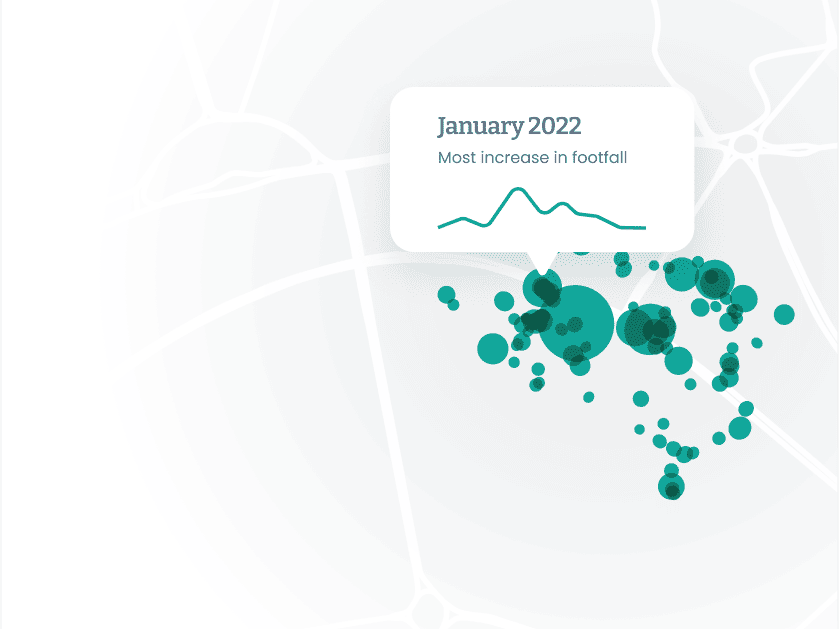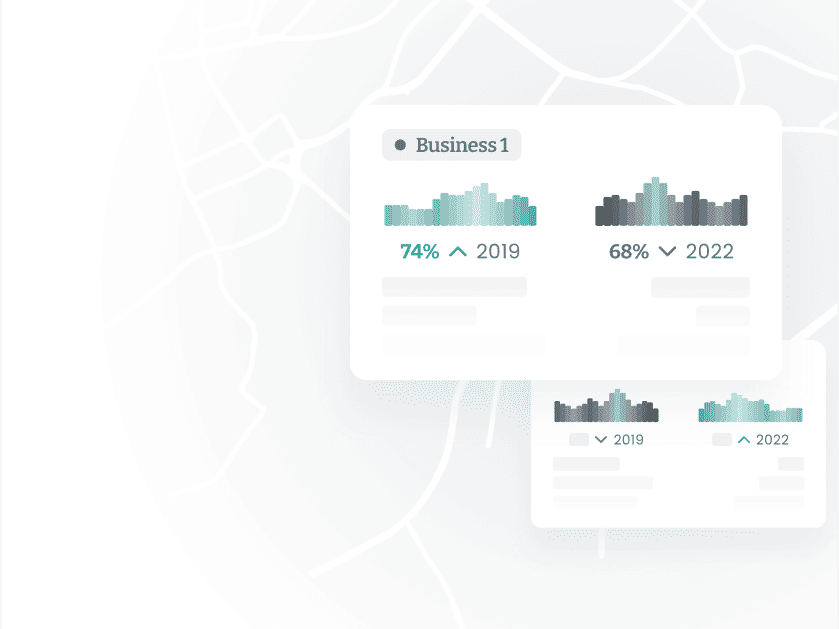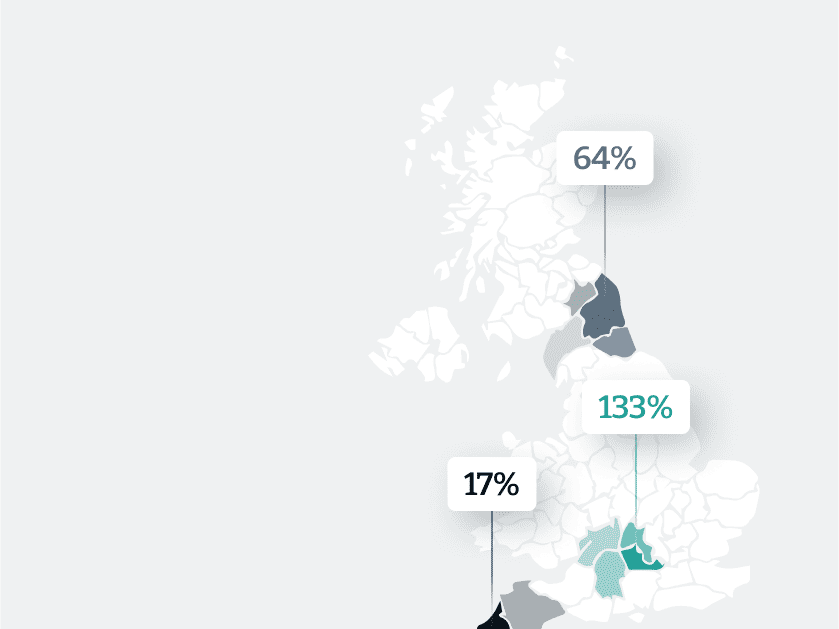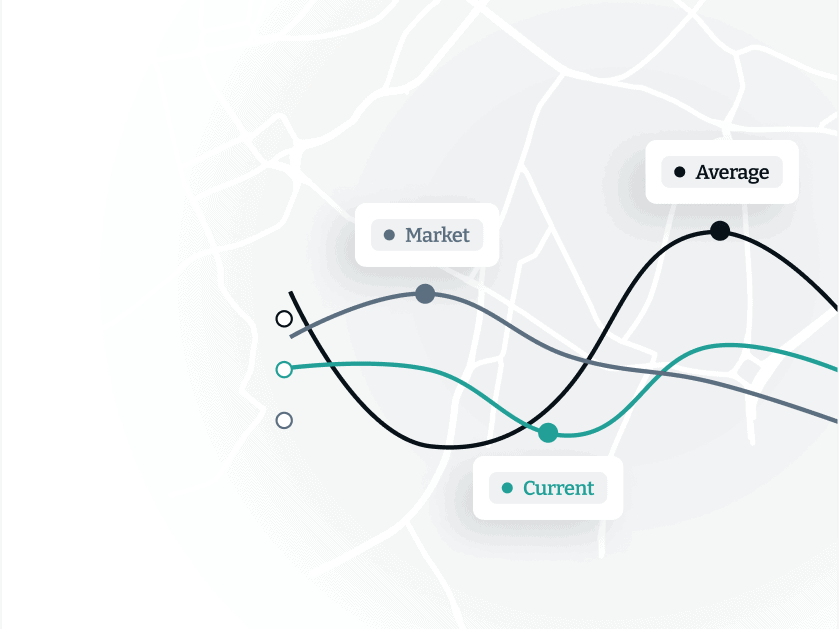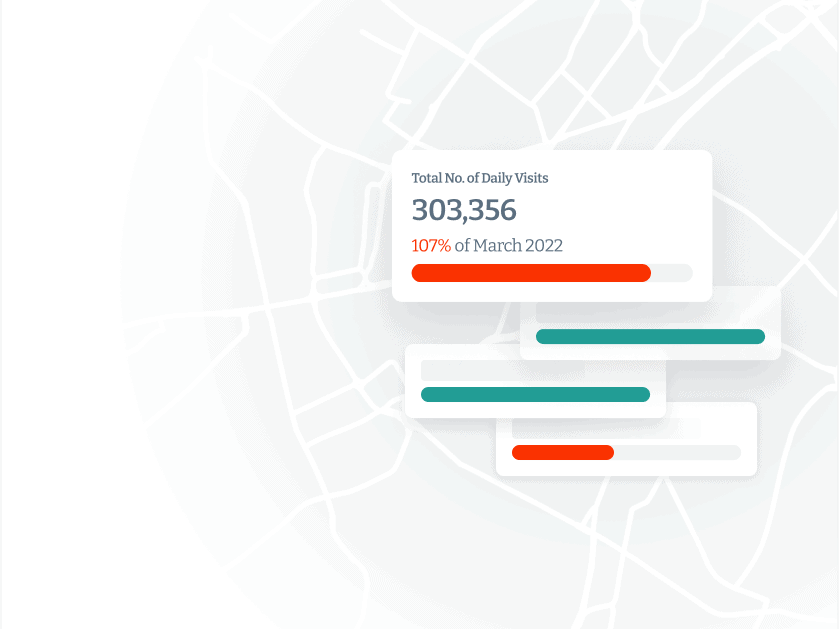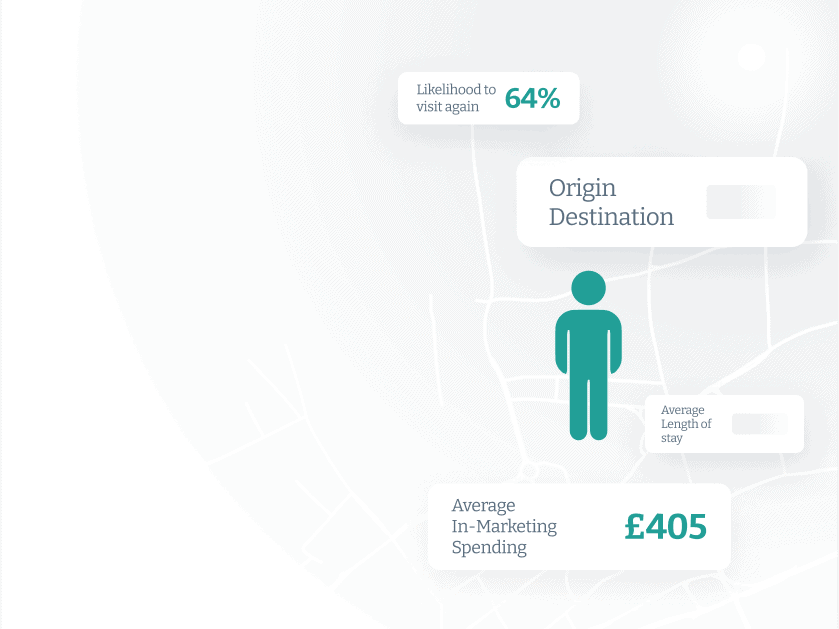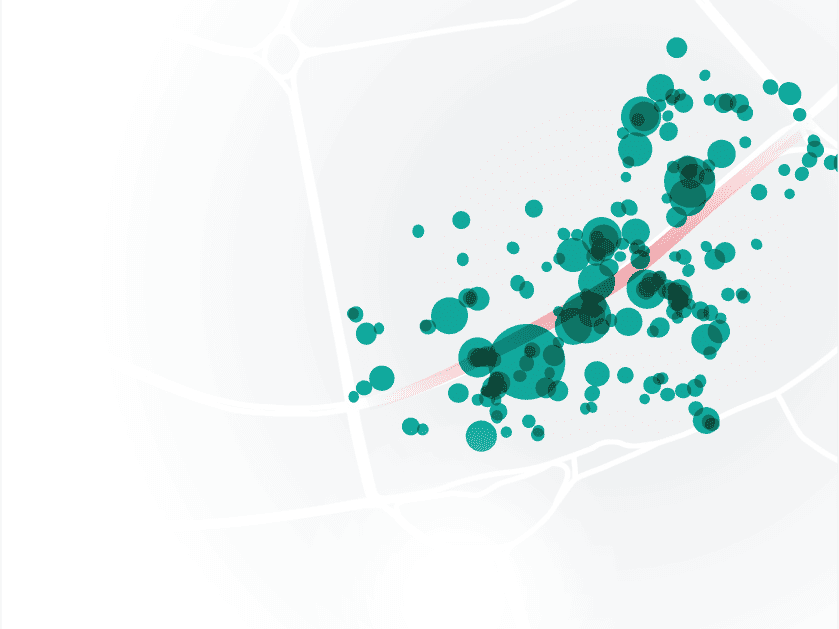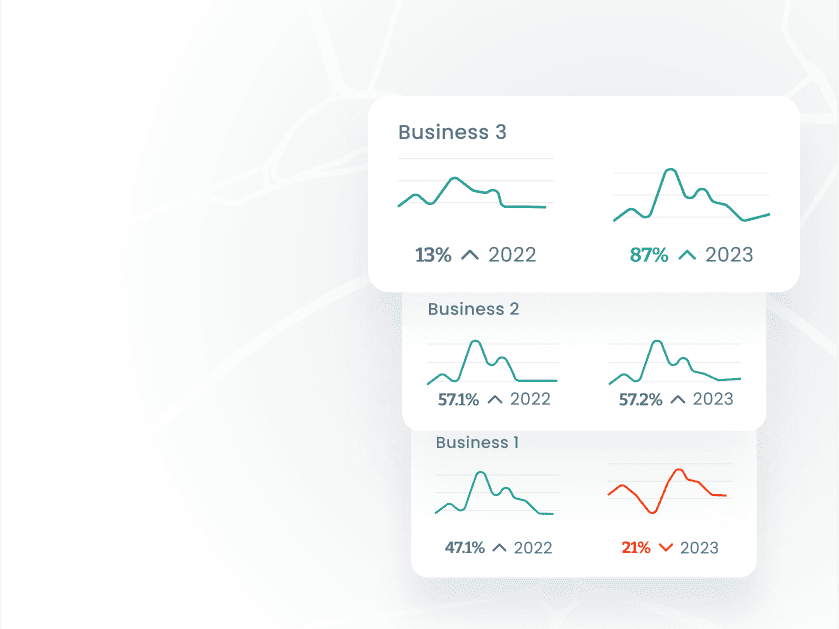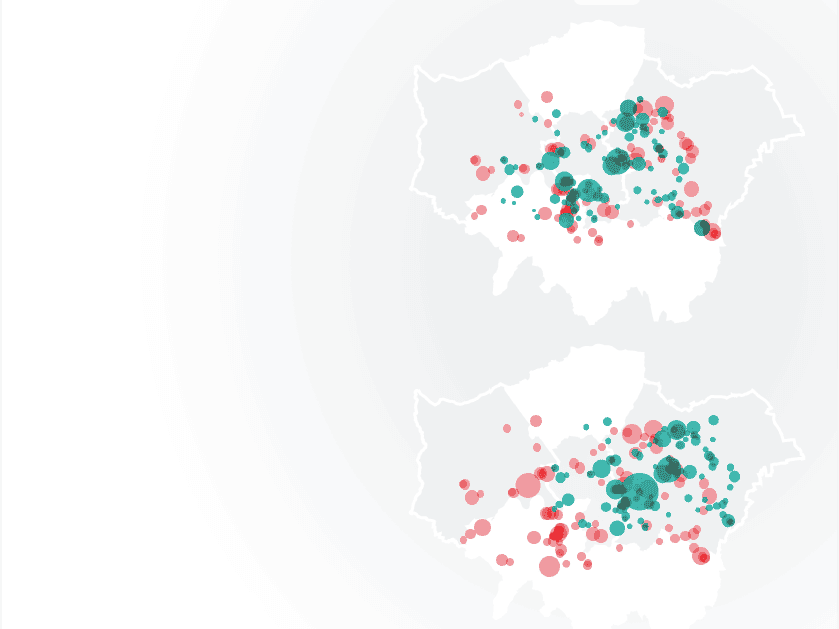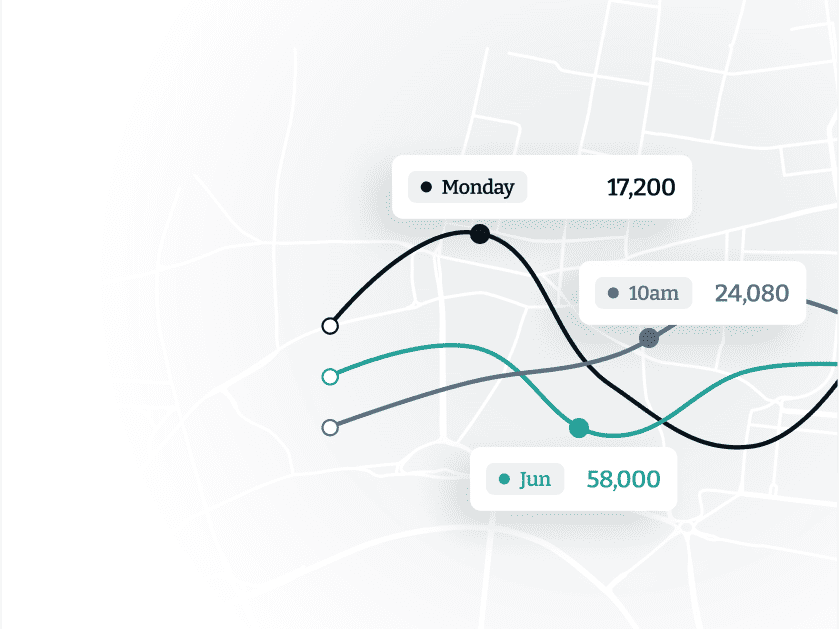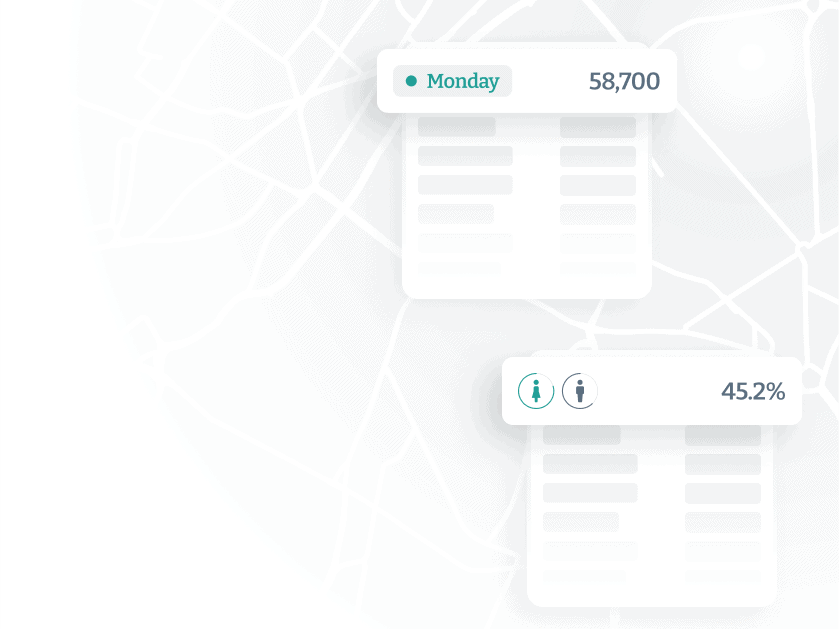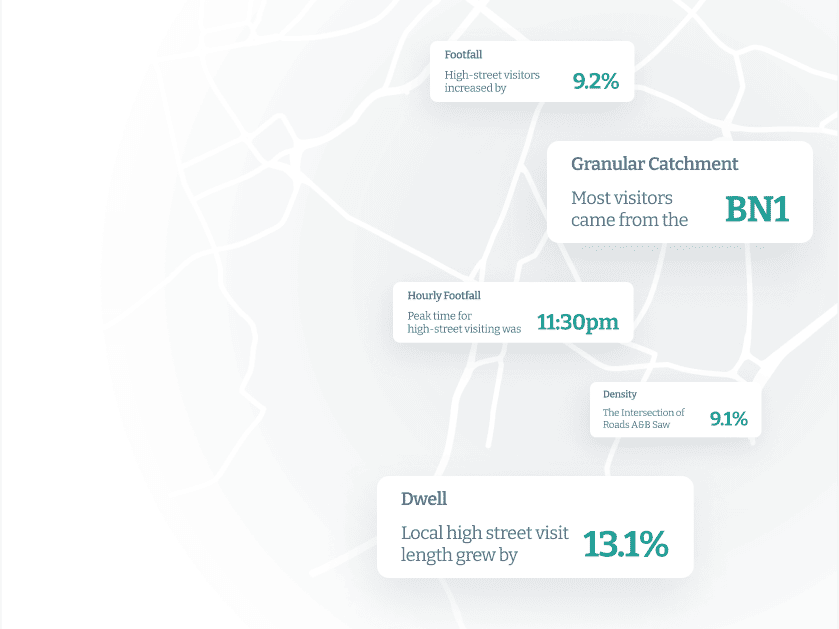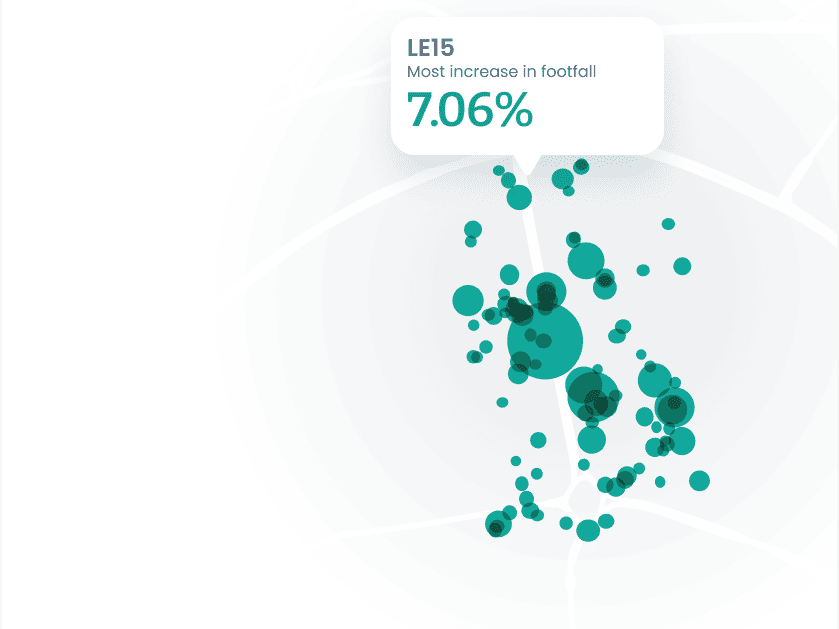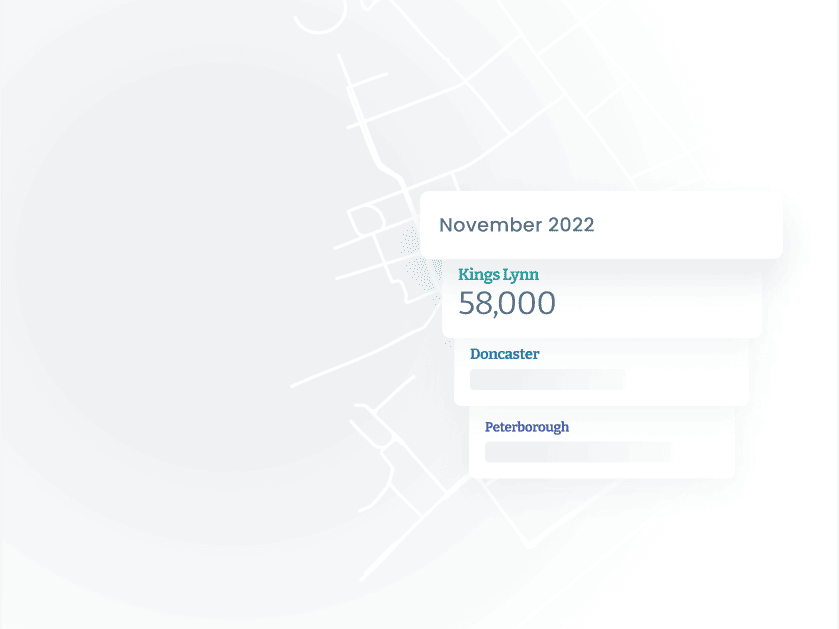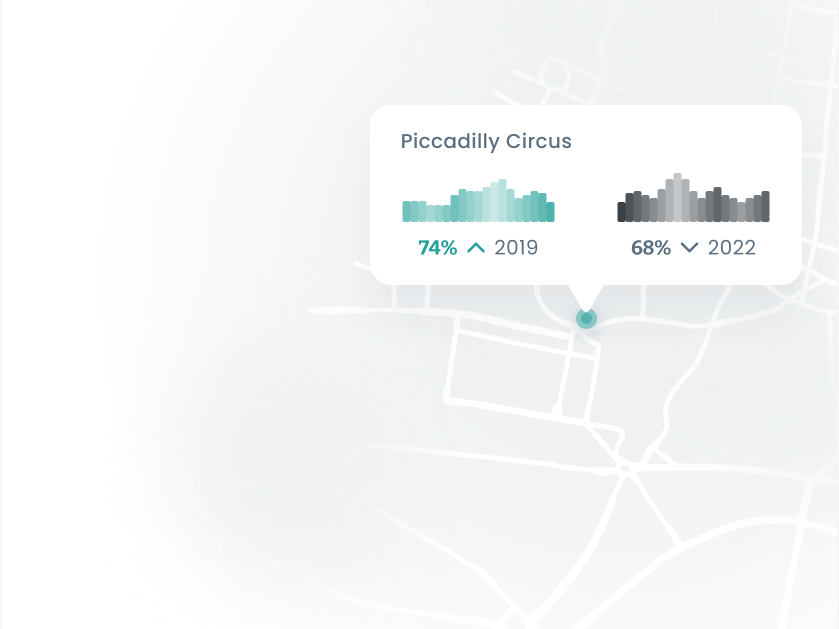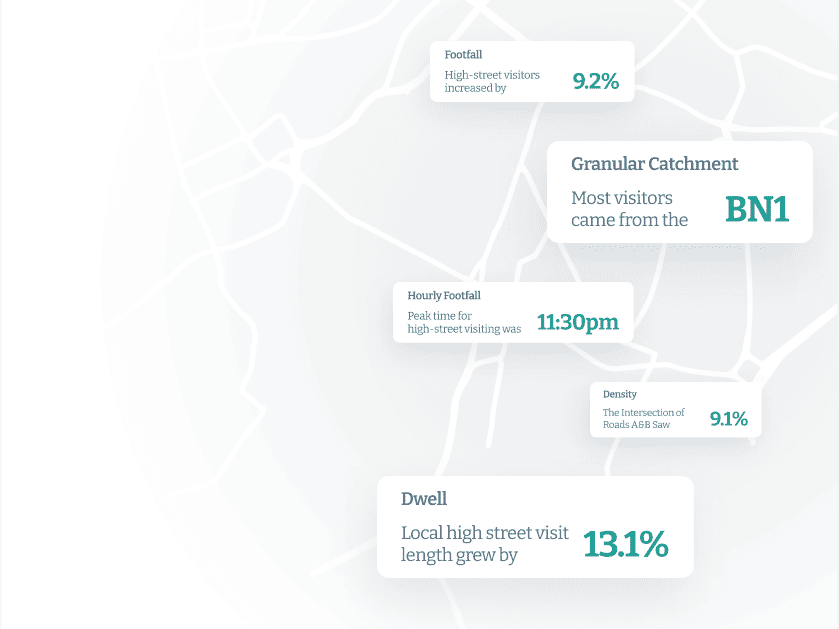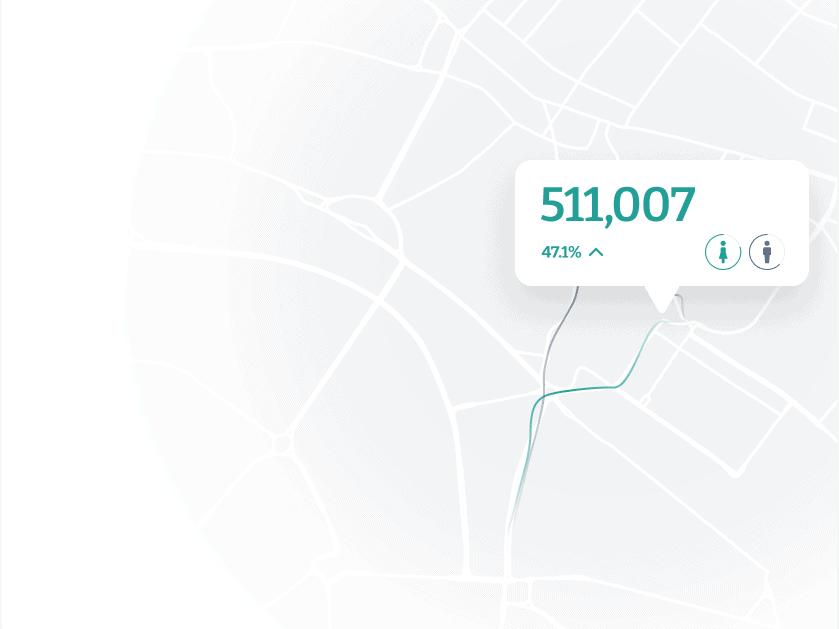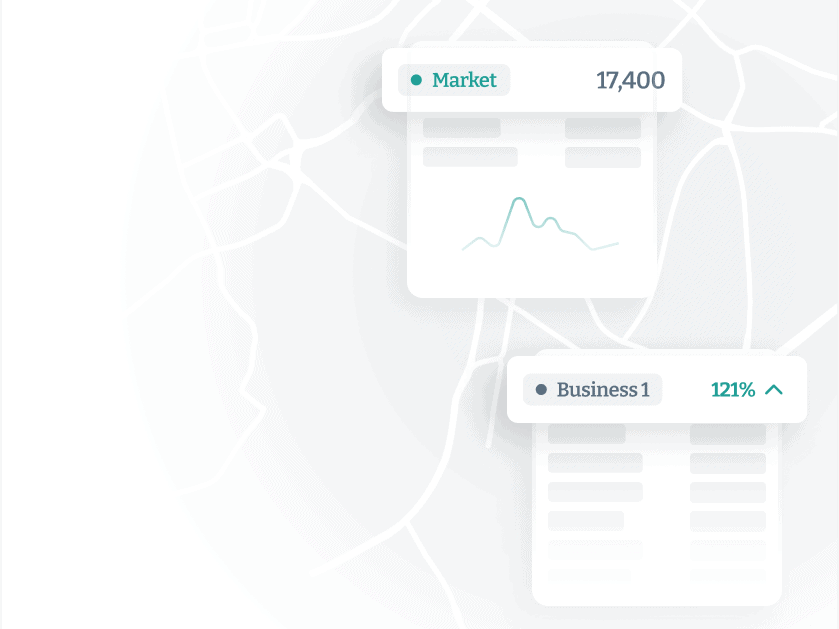Perform detailed market analysis
What data can we use to uncover opportunities?
What data can we use to more effectively mitigate risks?
How can our team gain a competitive edge in the market?
Estimate demand
Tap into new opportunities and estimate the demand for specific products or services in different areas with foot traffic patterns and customer behaviour insights.
Surface seasonal trends
Stay ahead of how foot traffic and customer behaviour change seasonally to optimise marketing campaigns and offerings that align with seasonal trends.
Benchmark location performance
Stay on top of foot traffic trends across different locations and identify areas with growth potential with actionable location insights.
Optimise market entry
Enter a new market with confidence with strategic insights on foot traffic trends and customer engagement.
Mitigate economic uncertainty
Stay ahead of economic movement local economic conditions on customer behaviours.
3400
Stores
38
Countries
$12.5Bn
Annual sales
Huq’s catchment insights allows JD to more accurately assess the impact of the wider retail catchment on the sales potential of new store opportunities
Alastair Browne, JD Group Head of Site Research & Strategic Insight

360 location visibility
How can we place new locations more strategically?
What can I do to improve the appeal of local places?
How can we react faster to changing environments?
Make accurate customer profiles
Easily tailor your offerings to match the characteristics of the local customer base using insights into demographics, behaviours, and preferences of visitors in a specific location.
Improve foot traffic management
Make informed decisions about placement and marketing with insights into peak visit times, popular routes, and areas of interest to make informed decisions about placement, marketing, and amenities.
Stay ahead of competitors
Surface your strengths and weaknesses with comparisons of foot traffic and customer behaviour at your location with those of competitors nearby.
Optimise placemaking strategies
Enhance the overall customer experience with insights that help identify high-traffic zones within a location.
Intelligent predictive modelling
Leverage historical mobility data to build predictive models that can forecast future foot traffic trends, allowing you to anticipate changes and optimise strategies proactively.
3400
Stores
38
Countries
$12.5Bn
Annual sales
Huq’s catchment insights allows JD to more accurately assess the impact of the wider retail catchment on the sales potential of new store opportunities
Alastair Browne, JD Group Head of Site Research & Strategic Insight

Accurate risk assessments
How can location data help enhance our decision-making?
How can I better potential strategic vulnerabilities in my portfolio?
How can I proactively forecast risk?
Understand a location's risk
Understand the risk associated with a specific property or location with foot traffic trends, visit frequencies, and customer engagement to gauge the level of activity.
Uncover competitors' strategy
Benchmark how your property is performing against others with property to property comparison of foot traffic patterns and customer behaviours.
Stay ahead of economic trends
Identify potential risk factors that could impact property performance or market demand by overlaying mobility data with relevant economic indicators such as GDP growth, unemployment rates, or consumer sentiment.
Predict seasonal impact
Surface unanticipated seasonal impacts with on foot traffic, customer behaviour, and performance changes during peak and off-peak periods.
Uncover historic trends
Easily Identify long-term trends and potential future risks in foot traffic and customer engagement with historic insights into patterns of stability, growth, or decline.
3400
Stores
38
Countries
$12.5Bn
Annual sales
Huq’s catchment insights allows JD to more accurately assess the impact of the wider retail catchment on the sales potential of new store opportunities
Alastair Browne, JD Group Head of Site Research & Strategic Insight

Re-strategising store placement
How can I improve capture while decreasing cannibalisation?
How can location data help us benchmark success?
How can we gain a competitive market edge?
Understand your existing markets
Leverage Mobility data to create a robust picture of the market that covers movement patterns, foot traffic, and visit durations across various locations.
Monitor placement performance
Evaluate the performance of your current placements with insights on which areas experience high foot traffic, peak visit times, and strong customer engagement to pinpoint underperforming locations.
Prevent customer cannibalisation
Pinpoint the demographics, preferences, and behaviours of visitors in different areas to tailor your new placement strategies.
Find high potential areas
Leverage the mobility data to identify areas with high foot traffic and optimal trends, aligning with your target audience's preferences.
Monitor and test in real time
Monitor the impact of your changes and new placement strategies using insights on foot traffic, customer engagement, and other relevant metrics to assess the effectiveness of the re-strategised placements.
Huq’s mobility data helps us to make better investment decisions and allows us to appropriately manage risk on behalf of our investor clients.
Jonathan Bayfield, Head of UK Real Estate Research at Aviva Investors

Breaking decision paralysis
How can I make better-informed choices?
What can we do to mitigate market uncertainties?
How can we be confident in our decision-making?
Accurate view of your market
Look for trends, patterns, and insights that directly relate to the decision you're facing. Identify key performance indicators, such as foot traffic trends, customer behaviour, or location popularity, that provide a clear picture of the situation.
Data-driven prioritisation
Leverage actionable insights to pinpoint areas of greater need and break down your decision into key options or scenarios.
Monitor and test in real time
Test the waters, learn from real-world outcomes, and adjust your strategy based on before and after impact and the data-driven insights you gather.
Uncover new investment risks
Mitigate risk while diversifying your investments across locations with insights into the stability of foot traffic, competition in the area, and economic indicators.
223Bn
£GBP AUM
900+
Employees
12
Countries
Huq’s mobility data helps us to make better investment decisions and allows us to appropriately manage risk on behalf of our investor clients
Huq’s mobility data helps us to make better investment decisions and allows us to appropriately manage risk on behalf of our investor clients
Jonathan Bayfield, Head of UK Real Estate Research at Aviva Investors

Validating government funding
How can we maximise the impact of our funding spend?
How can data help us better demonstrate accountability?
How can I help gather evidence needed for further funding?
Improve your reporting
Validate the effectiveness of funding allocation with measurements of success such as increased foot traffic, extended dwell times, or improved visit frequency.
Understand your impact
Easily identify any significant positive shifts that can be attributed to the funding spend with insights into before and after the implementation of funding initiatives. Analyse the changes in foot traffic, customer engagement, and overall economic activity in the targeted areas.
Location-specific insights
Validate the impact of initiatives on attracting visitors and driving economic activity benefiting via footfall and catchment trends, preferences, and travel patterns.
Drive informed decisions
Track the progress of funding initiatives and make timely strategies based on emerging insights to optimise their impact. Ensure that funding is being allocated to areas that consistently show positive results with data-driven adjustments.
Get rapid feedback
Leverage foot traffic data and customer behaviours to validate the effectiveness of your new store strategy and make adjustments as needed.

985k
Population
23.8Bn
£GDP
187
Stations & hubs
Colleagues in local government now use outputs from Huq’s data for travel insights across the Glasgow City region. Uses include origin-destination analyses, and learning what draws people to local neighbourhoods
Dr Andrew McHugh, Senior Data Science Manager, UBDC / University of Glasgow
Competitive benchmarking
How can I make instant, informed decisions?
How can data help us refine our competitive strategies?
How can we gain a competitive market edge?
Understand your target market
Create a robust picture of the market that covers movement patterns, foot traffic, and visit durations across various locations. Identify complete customer profiles and unique insights by laying in existing data.
Uncover competitors' strategies
Pinpoint your key competitors' locations and areas of operation and leverage mobility data to understand their foot traffic patterns, peak visit times, and customer engagement at each location.
Benchmark your performance
See how you compare to your competitors and identify areas where you excel and areas that require improvement with foot traffic trends, visit durations, and customer behaviour at both your locations and your competitors' locations.
Create deeper analysis
Compare the performance of specific location types, such as urban centres or malls, between your business and competitors. Break down the data by demographics to understand which customer groups are more drawn to your offerings versus your competitors'.
Speed up strategic adaptation
Utilise the insights gained from the mobility data to optimise your offerings, marketing, and placement strategies based on the data-driven insights you uncover.
223Bn
£GBP AUM
900+
Employees
12
Countries
Huq’s mobility data helps us to make better investment decisions and allows us to appropriately manage risk on behalf of our investor clients
Huq’s mobility data helps us to make better investment decisions and allows us to appropriately manage risk on behalf of our investor clients
Jonathan Bayfield, Head of UK Real Estate Research at Aviva Investors

Site selection
How can I make targeted placement decisions?
How can we better understand customer behaviours?
How can data help us capture customer preferences?
Optimise your current portfolio
Ensure your locations align with your target audience and maximise business objectives by identifying areas with high foot traffic, frequent visits, and customer engagement.
Pinpoint your audience
Understand the demographics, behaviours, and preferences of the visitors in the identified areas.
Identify new markets
Find market potential in trends on foot traffic, visit frequency, and economic indicators. Determine if the area has room for growth and if there's a strong demand for your offerings.
Gain a competitive edge
Identify any gaps or opportunities in a competitor's locations where you can offer unique value to customers that competitors may be missing.
Drive informed decisions
Leverage foot traffic data and customer behaviours to validate the effectiveness of your new store strategy and make adjustments as needed.
3400
Stores
38
Countries
$12.5Bn
Annual sales
Huq’s catchment insights allows JD to more accurately assess the impact of the wider retail catchment on the sales potential of new store opportunities
Alastair Browne, JD Group Head of Site Research & Strategic Insight

Placemaking and leasing
How can we enhance retail customer experiences?
How can data help increase tenant satisfaction?
How can I drive engagement and revenue?
Pinpoint high traffic zones
Identify high-traffic areas within your properties or retail spaces through foot traffic patterns and visit frequencies. Pinpoint prime locations for placemaking initiatives or high-demand spaces for leasing to maximise visibility and engagement.
Surface customer patterns
Understand customer behaviour and preferences within your properties with popular routes, dwell times, and points of interest. Strategically position amenities, retail offerings, and gathering spaces in areas that align with customer movement.
See routes and movements
Find patterns in popular destinations, peak travel times, and recurring origin and destination movement to gain insights into typical travel behaviours with common travel routes, modes of transportation used, and frequency of travel.
Improve planning
Identify seasonal trends that attract visitors with targeted placemaking activities or lease spaces to align with these trends and optimise your offerings and promotions.
Drive engagement
Monitor how placemaking initiatives or newly leased spaces impact customer behaviour and leverage location insights to make adjustments to your strategies.
223Bn
£GBP AUM
900+
Employees
12
Countries
Huq’s mobility data helps us to make better investment decisions and allows us to appropriately manage risk on behalf of our investor clients
Huq’s mobility data helps us to make better investment decisions and allows us to appropriately manage risk on behalf of our investor clients
Jonathan Bayfield, Head of UK Real Estate Research at Aviva Investors

Improve capital transactions
How can our team understand metrics for successful capital transactions?
How can data help us minimise transaction risks?
How can I increase the success rate of investments?
Identify market demand
Understand the demand for specific types of properties or services in different locations for targeted offerings that lead to successful transactions.
Intelligent investment decisions
Make informed decisions about property acquisitions or divestitures using level of activity in the area and customer behaviour analyses around potential investment properties.
Monitor tenant and occupancy
Gauge tenant satisfaction and identify opportunities for optimising lease agreements or attracting new tenants with foot traffic, dwell times, and visit pattern insights.
Foresee and mitigate risk
Monitor the performance of properties or financial assets with historical foot traffic trends and comparing them to market benchmarks.
Optimise negotiation and pricing
Showcase the value of a property's location when negotiating leases or property prices with demand-based insights.
223Bn
£GBP AUM
900+
Employees
12
Countries
Huq’s mobility data helps us to make better investment decisions and allows us to appropriately manage risk on behalf of our investor clients
Huq’s mobility data helps us to make better investment decisions and allows us to appropriately manage risk on behalf of our investor clients
Jonathan Bayfield, Head of UK Real Estate Research at Aviva Investors











